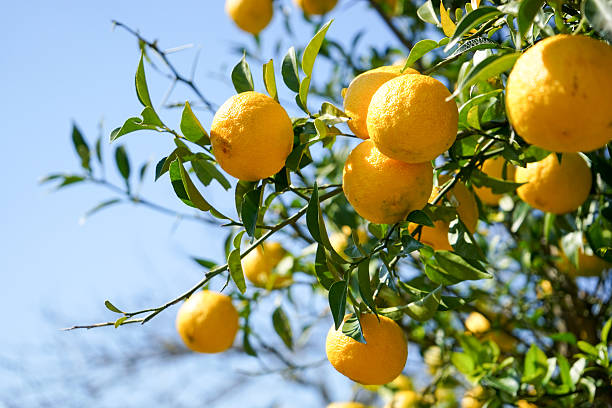
Fresh yuzu orange tree
innovuscollege.com – When it comes to culinary treasures from Japan, yuzu stands out as one of the most intriguing and versatile ingredients. This aromatic citrus fruit, prized for its distinct flavor and vibrant aroma, has captivated chefs and food enthusiasts around the world. Whether enhancing savory dishes, sweet treats, or refreshing beverages, yuzu adds a unique twist that elevates any culinary creation.
What is Yuzu?
Yuzu (Citrus junos) is a citrus fruit native to East Asia, primarily cultivated in Japan, Korea, and China. Resembling a small, uneven-skinned lemon or lime, yuzu ranges in color from green to bright yellow as it ripens. Unlike common citrus fruits, yuzu is not typically eaten fresh due to its tartness and minimal flesh. Instead, its juice and aromatic zest are the stars of the show.
The flavor profile of yuzu is what sets it apart. Imagine a delightful combination of lemon, lime, and grapefruit, with floral undertones and a tangy kick. This complex and refreshing taste makes it a favorite in both traditional and modern cuisine.
Yuzu in Traditional Japanese Cuisine
In Japanese cooking, yuzu has been used for centuries as a key ingredient in various dishes and condiments. Some traditional uses include:
- Ponzu Sauce
- Yuzu juice is a vital component of ponzu, a tangy, savory sauce made with soy sauce, mirin, and dashi. This versatile condiment is often served with grilled meats, sashimi, and salads.
- Yuzu Kosho
- A spicy paste made from yuzu zest, chili peppers, and salt, yuzu kosho is a beloved condiment that adds a burst of flavor to soups, grilled fish, and yakitori (grilled chicken skewers).
- Yuzu Tea (Yujacha)
- In Japan and Korea, yuzu is preserved with sugar or honey to create a marmalade-like base for hot or cold yuzu tea. This comforting drink is known for its refreshing taste and potential health benefits.
- Hot Pots and Soups
- Thin slices of yuzu peel are often added to soups and hot pots to infuse a subtle citrus aroma.
Yuzu in Modern Culinary Innovations
In recent years, yuzu has become a trendy ingredient in global cuisine, thanks to its versatility and unique flavor. Some innovative uses include:
- Cocktails and Mocktails
- Yuzu juice is a popular addition to cocktails and mocktails, bringing a zesty brightness that complements spirits like gin, vodka, and sake. Yuzu-flavored seltzers and tonics have also gained popularity.
- Desserts
- Yuzu’s tartness pairs beautifully with sweet flavors, making it a favorite in desserts like sorbets, cheesecakes, and macarons. Yuzu-flavored chocolates and ice creams have also become a hit.
- Savory Dishes
- Chefs around the world use yuzu to enhance dishes ranging from seafood and poultry to salads and marinades. Its acidity helps balance rich and fatty flavors.
- Baking
- Yuzu zest and juice are increasingly used in baked goods, including cakes, cookies, and bread, to add a refreshing twist.
Health Benefits of Yuzu
In addition to its culinary appeal, yuzu is packed with nutrients and potential health benefits:
- Rich in Vitamin C: Yuzu is an excellent source of vitamin C, which supports immunity and skin health.
- Antioxidant Properties: It contains antioxidants that may help reduce inflammation and promote overall well-being.
- Aromatherapy Benefits: The fragrant oil from yuzu peel is used in aromatherapy for relaxation and stress relief.
How to Use Yuzu at Home
While fresh yuzu can be challenging to find outside of Asia, its juice, zest, and related products are increasingly available in specialty stores and online. Here are some tips for incorporating yuzu into your cooking:
- Dressings and Marinades: Mix yuzu juice with olive oil, soy sauce, or sesame oil for a bright and flavorful dressing.
- Baking: Add a teaspoon of yuzu zest to your favorite cake or cookie recipe for a citrusy twist.
- Beverages: Create a refreshing drink by combining yuzu juice, sparkling water, and a touch of honey.
- Flavor Boost: Sprinkle yuzu zest over grilled fish or vegetables to enhance their flavors.
The Global Appeal of Yuzu
Yuzu’s rise in global cuisine is a testament to its versatility and unique character. From fine dining establishments to casual eateries, chefs and bartenders continue to explore its potential in creative and unexpected ways.
Whether you’re savoring a traditional Japanese hot pot or enjoying a yuzu-infused cocktail, this extraordinary citrus fruit offers an unforgettable taste of Japan’s culinary heritage. Its combination of tartness, fragrance, and complexity ensures that yuzu will remain a star ingredient for years to come.
So, the next time you come across yuzu at a store or on a menu, don’t hesitate to give it a try. It’s a simple way to elevate your culinary adventures and experience the magic of this Japanese treasure.






